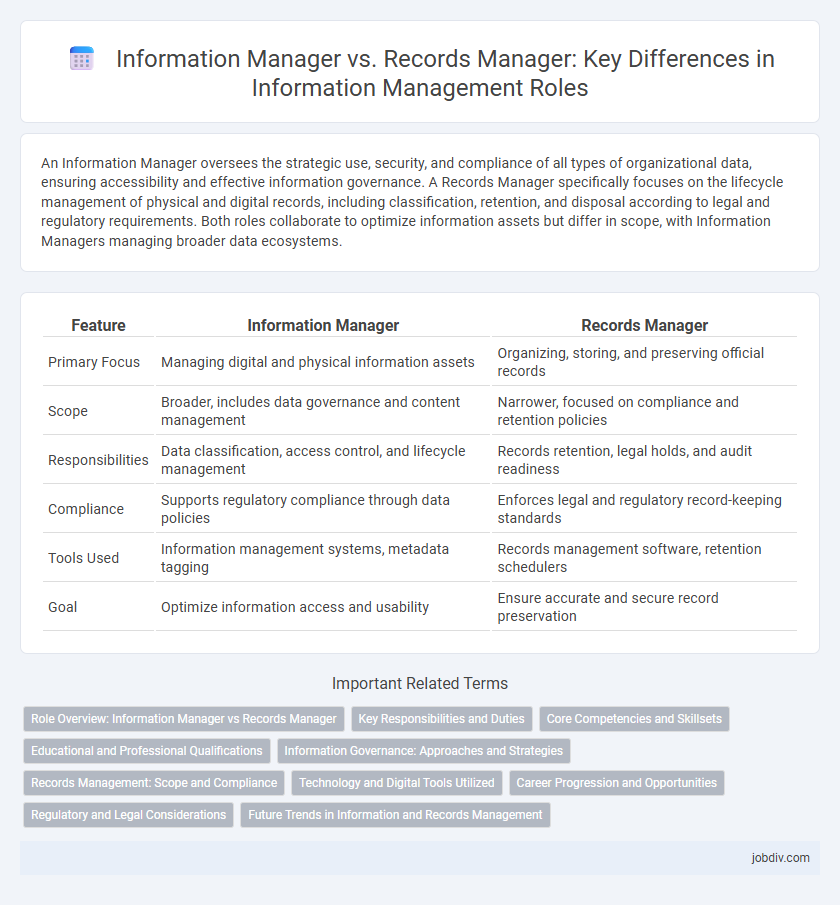An Information Manager oversees the strategic use, security, and compliance of all types of organizational data, ensuring accessibility and effective information governance. A Records Manager specifically focuses on the lifecycle management of physical and digital records, including classification, retention, and disposal according to legal and regulatory requirements. Both roles collaborate to optimize information assets but differ in scope, with Information Managers managing broader data ecosystems.
Table of Comparison
| Feature | Information Manager | Records Manager |
|---|---|---|
| Primary Focus | Managing digital and physical information assets | Organizing, storing, and preserving official records |
| Scope | Broader, includes data governance and content management | Narrower, focused on compliance and retention policies |
| Responsibilities | Data classification, access control, and lifecycle management | Records retention, legal holds, and audit readiness |
| Compliance | Supports regulatory compliance through data policies | Enforces legal and regulatory record-keeping standards |
| Tools Used | Information management systems, metadata tagging | Records management software, retention schedulers |
| Goal | Optimize information access and usability | Ensure accurate and secure record preservation |
Role Overview: Information Manager vs Records Manager
An Information Manager oversees the strategic handling, classification, and accessibility of organizational data, ensuring information aligns with business objectives and compliance requirements. A Records Manager focuses specifically on the creation, maintenance, retention, and disposal of records, emphasizing regulatory adherence and risk management. Both roles collaborate to optimize data governance, but Information Managers have a broader scope encompassing various types of information beyond formal records.
Key Responsibilities and Duties
Information Managers oversee the strategic management, organization, and security of an organization's information systems, ensuring data accessibility and compliance with data governance policies. Records Managers focus on the lifecycle of physical and digital records, including classification, retention, and disposal in accordance with legal and regulatory requirements. Both roles require expertise in data management, but Information Managers prioritize system-wide data integration while Records Managers emphasize structured recordkeeping and archival processes.
Core Competencies and Skillsets
Information Managers excel in data governance, information architecture, and strategic planning, ensuring efficient data flow and compliance across organizations. Records Managers specialize in records lifecycle management, retention policies, and regulatory compliance, emphasizing secure document handling and archival processes. Both roles require strong analytical abilities, attention to detail, and proficiency with information management systems and relevant software tools.
Educational and Professional Qualifications
Information Managers typically hold degrees in information science, library science, or business administration, often complemented by certifications such as Certified Information Professional (CIP) or Project Management Professional (PMP). Records Managers usually possess qualifications in archival science, records management, or legal studies, with industry-recognized certifications like Certified Records Manager (CRM) or Information Governance Professional (IGP). Both roles demand strong organizational skills and knowledge of data governance, but Records Managers emphasize compliance and retention policies while Information Managers focus on information strategy and technology integration.
Information Governance: Approaches and Strategies
Information governance in Information Manager roles emphasizes comprehensive data lifecycle management, policy development, and cross-departmental collaboration to ensure data accuracy, security, and compliance. Records Managers focus on systematic classification, retention schedules, and regulatory adherence specific to physical and digital records management. Effective information governance strategies integrate both roles to balance operational efficiency with regulatory requirements and risk mitigation.
Records Management: Scope and Compliance
Records managers specialize in the systematic control of records throughout their lifecycle, ensuring compliance with legal, regulatory, and organizational requirements. Their scope includes classification, retention scheduling, secure storage, and authorized disposal or archiving to mitigate risks associated with data breaches and non-compliance penalties. Effective records management directly supports information governance frameworks by maintaining accurate, accessible, and verifiable documentation essential for audits and regulatory inspections.
Technology and Digital Tools Utilized
Information Managers leverage advanced digital tools such as enterprise content management (ECM) systems, artificial intelligence (AI) for data analytics, and cloud-based collaboration platforms to organize and optimize information flow across organizations. Records Managers focus on specialized technology like electronic records management systems (ERMS), digital archiving tools, and compliance software to ensure secure, systematic storage, retrieval, and retention of official documents. Both roles utilize technology to enhance information governance, but Information Managers emphasize broad data integration while Records Managers prioritize regulatory compliance and lifecycle management.
Career Progression and Opportunities
Information Managers oversee the strategic handling and utilization of data across organizations, often progressing into roles such as Chief Data Officer or IT Director due to their broad expertise in information systems and business integration. Records Managers specialize in the organization, preservation, and compliance of physical and electronic records, with career opportunities advancing toward positions like Compliance Officer or Archivist, emphasizing regulatory and historical document management. Professionals shifting from Records Management to Information Management can leverage their foundational knowledge to expand into broader information governance and digital transformation roles.
Regulatory and Legal Considerations
Information managers focus on compliance with data protection regulations such as GDPR and HIPAA, ensuring that organizational information handling meets legal standards. Records managers specialize in the lawful retention, archiving, and disposal of records according to regulatory mandates like SOX and FOIA to prevent legal risks. Both roles collaborate to maintain regulatory adherence and mitigate potential legal liabilities related to information governance.
Future Trends in Information and Records Management
Future trends in information and records management emphasize the integration of artificial intelligence and machine learning to automate classification and retrieval processes. Information managers increasingly focus on data governance and cybersecurity to protect sensitive digital assets, while records managers adapt to hybrid environments combining physical and electronic records. The convergence of these roles supports enhanced compliance, real-time analytics, and improved decision-making across organizations.
Information Manager vs Records Manager Infographic

 jobdiv.com
jobdiv.com